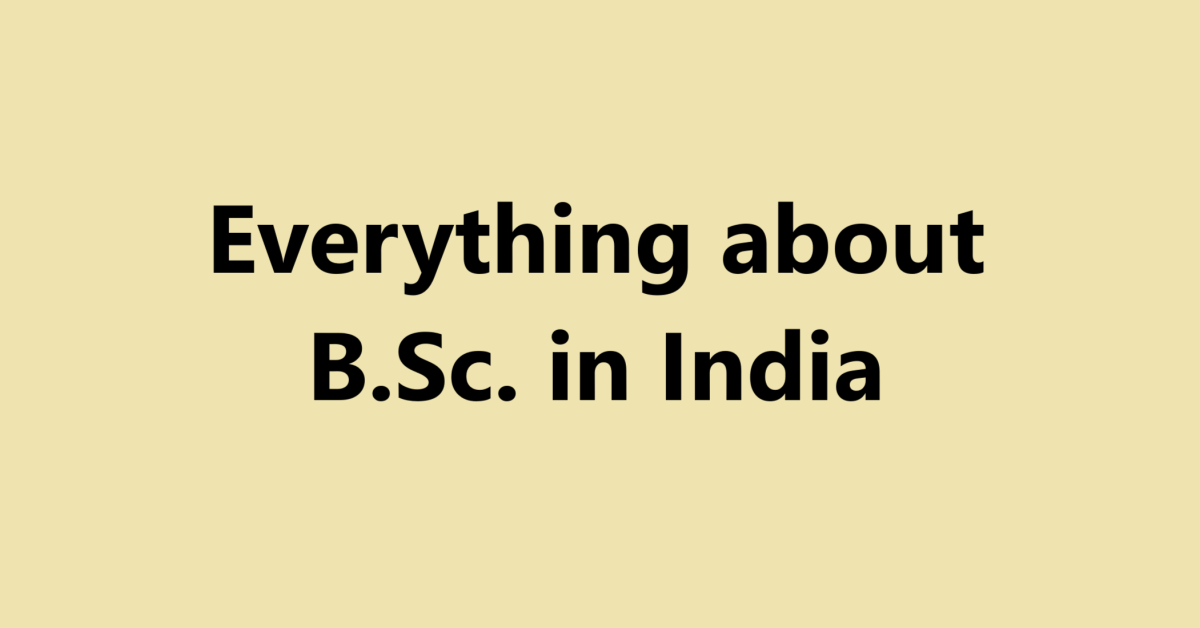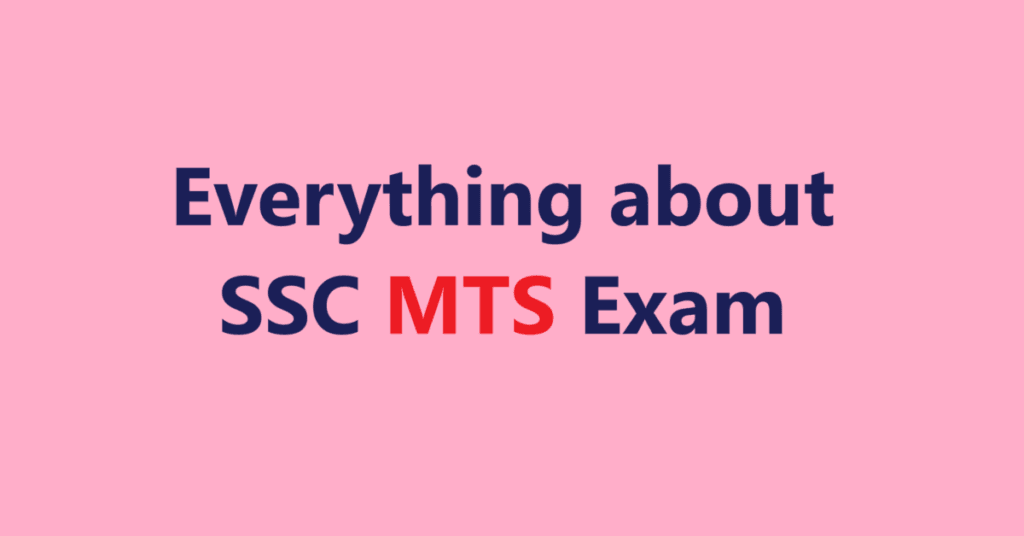A Bachelor of Science (B.Sc.) degree in India is one of the most popular undergraduate programs, primarily focused on scientific and technical subjects. Here’s a comprehensive overview covering various aspects of pursuing a B.Sc. in India:
What is B.Sc.?
A Bachelor of Science (B.Sc.) is an undergraduate academic degree awarded for completing a program in the field of science. The duration of the course is typically 3 years (6 semesters), though some institutions offer a 4-year degree with an additional research project or specialization.
Specializations Offered
B.Sc. programs in India offer various specializations, allowing students to choose fields of interest. Some popular specializations include:
- B.Sc. in Physics
- B.Sc. in Chemistry
- B.Sc. in Biology
- B.Sc. in Mathematics
- B.Sc. in Computer Science
- B.Sc. in Environmental Science
- B.Sc. in Biotechnology
- B.Sc. in Statistics
- B.Sc. in Microbiology
Eligibility Criteria
- Educational Qualification: Students must have completed their 10+2 education from a recognized board, typically with a background in science (Physics, Chemistry, and Mathematics/Biology).
- Minimum Marks: Most universities require candidates to have a minimum aggregate percentage (often around 50-60%) in their 10+2 examinations.
Admission Process
- Entrance Exams: Some universities and colleges require entrance exams for admission to their B.Sc. programs, especially for certain specializations. Common entrance exams include:
- Joint Entrance Examination (JEE) (for some universities)
- State-level entrance exams
- Merit-Based Admissions: Many colleges offer admission based on the marks obtained in the 10+2 examinations.
- Application Process: Candidates generally need to fill out an online application form for the respective universities/colleges and submit required documents.
Curriculum and Subjects
The B.Sc. curriculum typically includes a combination of core and elective subjects. The first year may cover foundational subjects, while the subsequent years allow for specialization. Common subjects in a B.Sc. degree may include:
- Core Subjects: Physics, Chemistry, Mathematics, Biology, Computer Science, Environmental Science, etc.
- Practical Labs: Practical sessions related to theoretical subjects.
- Project Work: Some programs require students to undertake research projects in their final year.
Career Opportunities
A B.Sc. degree opens up a wide range of career opportunities. Graduates can pursue various paths, including:
- Higher Education:
- M.Sc. (Master of Science) in a specialized field
- MBA (Master of Business Administration)
- Professional courses (e.g., B.Ed., MCA)
- Job Opportunities:
- Research Scientist
- Lab Technician
- Data Analyst
- Teaching positions (with additional qualifications)
- Environmental Consultant
- Quality Control Analyst
- Software Developer (with a specialization in Computer Science)
- Pharmaceutical Industry roles
- Government Jobs:
- Indian Forest Service (IFS)
- Public Sector Undertakings (PSUs)
- Research Organizations like ISRO, DRDO, etc.
Skill Development
During the course, students are encouraged to develop essential skills, including:
- Analytical Skills: Critical thinking and data analysis.
- Technical Skills: Proficiency in laboratory techniques and computer applications.
- Communication Skills: Ability to present findings and collaborate effectively.
- Research Skills: Conducting literature reviews and undertaking experiments.
Here are some frequently asked questions (FAQs) about the B.Sc. (Bachelor of Science) course in India, along with detailed answers:
FAQs About B.Sc. Course
1. What is a B.Sc. degree?
A Bachelor of Science (B.Sc.) is an undergraduate degree awarded for completing a program in science or related fields. It typically takes 3 years to complete, with a focus on scientific and technical subjects.
2. What specializations are available in B.Sc.?
Common specializations include:
- B.Sc. in Physics
- B.Sc. in Chemistry
- B.Sc. in Biology
- B.Sc. in Mathematics
- B.Sc. in Computer Science
- B.Sc. in Environmental Science
- B.Sc. in Biotechnology
- B.Sc. in Statistics
- B.Sc. in Microbiology
3. What are the eligibility criteria for B.Sc. admissions?
- Candidates must have completed 10+2 (or an equivalent examination) with a focus on science subjects (Physics, Chemistry, and Mathematics/Biology).
- A minimum aggregate percentage (usually around 50-60%) is often required.
4. How can I apply for a B.Sc. program?
Applications can be submitted online through the respective university or college websites. The process typically involves filling out an application form and attaching necessary documents.
5. Are entrance exams required for B.Sc. admissions?
Some universities and colleges may conduct entrance exams for certain B.Sc. programs or specializations. Examples include state-level entrance exams or specific university tests.
6. What does the B.Sc. syllabus include?
The syllabus generally consists of:
- Core subjects relevant to the specialization chosen.
- Practical laboratory sessions that complement theoretical learning.
- Research projects in the final year for certain programs.
7. What are the career options after completing a B.Sc. degree?
Graduates have multiple career paths, including:
- Higher studies (M.Sc., MBA, etc.)
- Research and development roles
- Teaching (after additional qualifications)
- Positions in healthcare, environmental science, data analysis, IT, etc.
- Government jobs in various sectors.
8. Can I pursue an M.Sc. after completing a B.Sc.?
Yes, after completing a B.Sc. degree, candidates can pursue a Master of Science (M.Sc.) in their chosen specialization or a related field.
9. Is a B.Sc. degree valid for civil service examinations?
Yes, candidates with a B.Sc. degree are eligible to appear for various civil service examinations, including UPSC (Indian Administrative Service, Indian Police Service, etc.).
10. Are there any skills developed during a B.Sc. course?
Yes, students develop critical skills, including:
- Analytical and problem-solving skills
- Technical proficiency in laboratory techniques
- Research capabilities
- Communication and teamwork skills
11. What is the difference between B.Sc. and B.Sc. Hons?
- B.Sc.: A general degree that covers a broad range of topics in different subjects.
- B.Sc. Hons: A specialized degree that involves more in-depth study of a specific subject, often requiring a research project or thesis.
12. What is the scope of a B.Sc. in India?
The scope of a B.Sc. degree is vast, covering various industries such as education, healthcare, research, information technology, and environmental sciences. The degree also provides a strong foundation for advanced study and specialized careers.
13. What is the typical duration of a B.Sc. program?
The B.Sc. program usually lasts for 3 years (6 semesters), though some colleges may offer a 4-year program with additional research or specialization options.
14. What if I want to change my specialization after the B.Sc.?
After completing a B.Sc., you can pursue master’s degrees in different disciplines or related fields, but you may need to meet specific eligibility criteria set by the universities.
Conclusion
A B.Sc. degree in India is a strong foundation for a plethora of science-related careers and further academic pursuits. The choice of specialization, college, and associated skills greatly influences the future career path.


